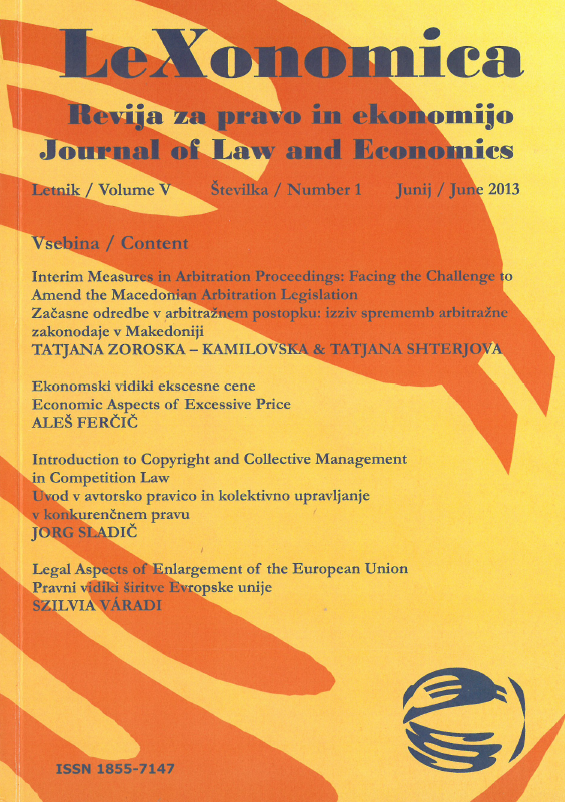Introduction to Copyright and Collective Management in Competition Law
Keywords:
intelektualna lastnina, avtorsko pravo, avtorske pravice, upravljanje, managment, copyright, common law, avtorska pravica, kontinentalno pravo, pravice intelektualne lastnine, prevladujoč položaj, zloraba prevladujoćega položaja, načelo solidarnost, trg avtorskih pravic, search marketAbstract
Copyright is an absolute intellectual property right. Historically it is of territorial nature. One of the central issues of copyright is the remuneration of authors. Copyright confers to its holder a legal monopoly comprising certain economic rights that are granted for pecuniary consideration. The economically most efficient way of management of copyright's pecuniary consideration is collective management. However, collective management covers due to the territorial nature of copyright only territory of a certain state. In competition law that might be considered as a monopoly by collecting societies limited to borders of states, in other words, there are issues of possible abuse of a dominant position.
Avtorska pravica je absolutna pravica intelektualne lastnine. Zgodovinsko je teritorialne narave. Eno od bistvenih vprašanj avtorske pravice je plačilo avtorjev. Avtorska pravica imetnikom podeli zakonit monopol nad nekaterimi materialnimi avtorskimi pravicami, ki se odstopijo odplačno. Ekonomsko najbolj učinkovitejši način upravljanja denarnega plačila za avtorske pravice je kolektivno upravljanje. Zaradi teritorialne narave avtorske pravice to zajema zgolj ozemlje določene države. To pa se v konkurenčnem pravu lahko obravnava kot monopolni oz. prevladujoč položaj organizacij za kolektivno upravljanje, s tem pa tudi vprašanje možne zlorabe takšnega položaja.
Downloads
References
Allendesalazar, R., Vallina, R. (2007), Collecting Societies: The Usual suspects, in: Ehlermann, C. - D., Atanasiu, I. (eds.) (2007), European Competition Law Annual 2005, The Interaction between Competition Law and Intellectual Property Law, 371–398 (London: Hart Publishing).
Bernd, B. (2008), Allgemeines Schuldrecht (Bern: Staempfli). Bertrand, A. R. (2011), Droit d'auteur 2011/2012 (Paris: Dalloz).
Brekamp, Ch. (2003), Einführung von Wettbewerbsstrukturen im Rahmen der kollektiven Verwertung, (Konstanz: University of Konstanz).
Commissiónnacional de la competencia (2009), Report on The Collective Management of Intellectual Property Rights, (Madrid: www.cncompetencia.es).
Fels, A., Walker, J. (2007), Australian Intellectual Property Law, Competition and Collecting Societies: Efficiency, Monopoly, Competition and Regulation, in: Ehlermann, C. - D., Atanasiu, I. (eds.) (2007), European Competition Law Annual 2005, The Interaction between Competition Law and Intellectual Property Law, 329–342 (London: Hart Publishing).
Gstalter, J. (2012), Droit de la concurrence et droits de propriété intellectuelle (Brussels: Bruylant).
Hewitt Pate, R. (2007), Pannel I: To What Extent Does IP Require/Justify A Special Treatment Under Competition Rules? in: Ehlermann, C. - D., Atanasiu, I. (eds.) (2007), European Competition Law Annual 2005, The Interaction between Competition Law and Intellectual Property Law, 3–33 (London: Hart Publishing).
Jenny, F. (2007), EC Competition Law Enforcement and Collecting Societies for Music Rights: What Are We Aiming For?, in: Ehlermann, C. - D., Atanasiu, I. (eds.) (2007), European Competition Law Annual 2005, The Interaction between Competition Law and Intellectual Property Law, 361–370 (London: Hart Publishing).
Lewinski von, S. (2012), Collectivism and its role in the frame of individual contracts, in: Rosén, J. (2012), Individualism and Collectiveness in Intellectual Property Law, 117–127 (Cheltenham, Edward Elgar Publishing).
Mestmäcker, E. - J. (2007), Collecting Societies, in: Ehlermann, C. - D., Atanasiu, I. (eds.) (2007), European Competition Law Annual 2005, The Interaction between Competition Law and Intellectual Property Law, 343–360 (London: Hart Publishing).
Schack, H. (2010) Urheber und Urhebervertragsrecht (Tübingen: J.C.B. Mohr).
Downloads
Published
Issue
Section
License
© Univerza v Mariboru, Pravna fakulteta, Univerzitetna založba
Prosti pristop
